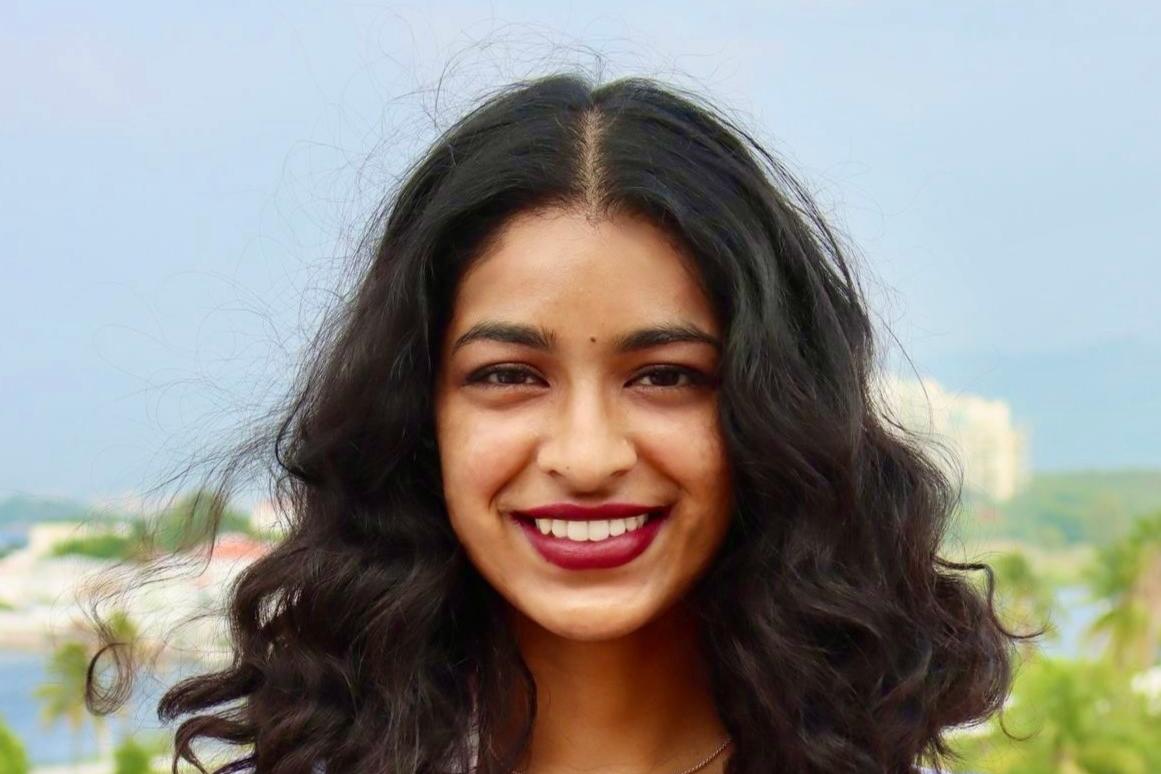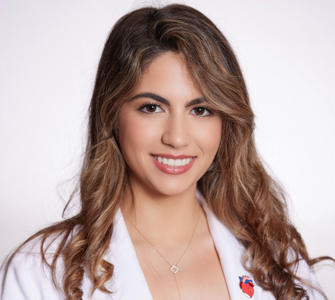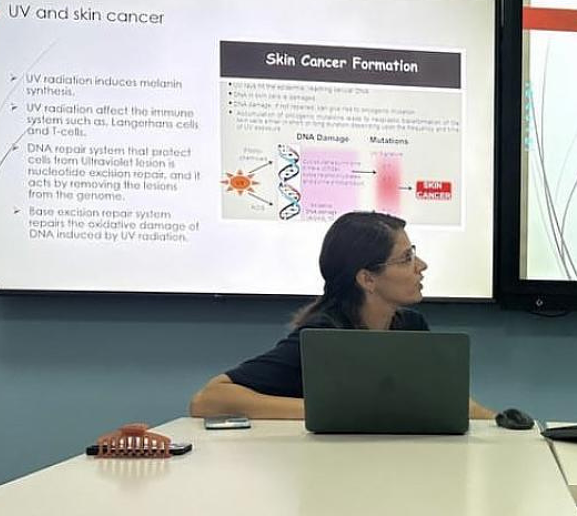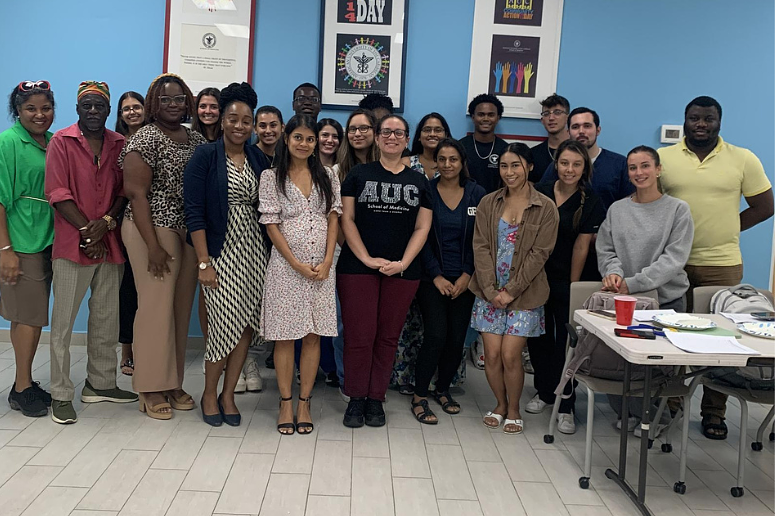AUC clinical student Amanda Kuruvilla, who is now completing rotations in the United Kingdom, served as a teaching assistant and tutor for multiple courses during her time in medical sciences at AUC’s Sint Maarten campus. She recently sat down with Aruna Ullal, academic counselor and lecturer, to share study tips for students in medical sciences and her approach to preparing for high-stakes exams.
Aruna Ullal: What strategies helped you be successful throughout your time in medical sciences?
Amanda Kuruvilla: Maintaining balance and accepting support when I needed it. Medical school is a huge adjustment and has taken a lot more self-reflection and understanding of myself than expected. I accommodated myself; I worked within my own limits and developed a strong understanding of them. I tested out several study strategies and stuck with what worked best for me. It looks different for different people, and I would encourage others to find what works best for them specifically.
Which extracurricular activities were you involved in?
I tutored a lot. I also served as Canadian Medical Student Association (CMSA) Prime Minister for two semesters. I was an orientation advisor (OA) for two semesters, then I was Head OA for the other two. In addition, I was part of the Community Engagement Certificate program, and I participated in Community Action Day.
How did you manage your time?
I decided what was important to me and made sure to take care of myself along the way. I set routines for myself and continuously tweaked them to ensure that my system was working as well as possible. I know that sometimes I can be very productive and get a lot of work done and other times, I just can’t focus, so I would capitalize on the bouts of productivity and not try to force myself when I couldn’t do it. I would use that time for something else, whether it be working out, self-care, or cleaning my apartment, etc.
What did your typical day look like?
Class, lunch, questions/review/studying, workout, shower, dinner, more studying, then a little break until bed. My attention span isn’t the greatest, so I need to take breaks in order to stay on task and stay productive. I tried really hard to ensure that I spent time on things besides school on a daily basis—balance is honestly key.
How did you spend your weekends?
Most weekends included sleeping in, walking or beach time, baking, cooking for the week, and church. I definitely studied, but l also spent time with friends and tried to do leisurely things. For instance, Friday nights were strictly date night, which I found to be invaluable for a long-distance relationship, while being in a high-stress program.
Tips and Skills for Succeeding at AUC
Were there any study methods or strategies that you tried and didn’t work for you?
Forcing myself to do work when I was tired or distracted. I found that it was always better to get the distractions out of my system because otherwise the time I spent trying to study wouldn’t be worth much. I also found that trying to do something because other people did it also did not help me, and I needed to stick with what worked best for me.
For example, a lot of people swear by Anki, but I can’t sit through flashcards. I’m not saying Anki isn’t a good resource—plenty of people LOVE it—it just wasn’t good for me, and that’s the point I’m trying to get across. Focus on what works for you and stick with it. It may differ from your friends, but that’s okay, as long as it’s working for YOU. Conversely, Sketchy has helped me with most subjects, so it’s all really based on you personally.
What courses did you tutor during your first two years of medical sciences?
Semester 2: Histology teaching assistant (TA) and Anatomy peer tutor
Semester 3: Immunology course tutor and Physiology I peer tutor
Semester 4: Physiology II course tutor and Medical Microbiology peer tutor
Semester 5: Molecules to Medicine (MTM), Medical Microbiology, Physiology II, Pharmacology, and Neurology course tutor
I also did some tutoring on the side, especially focusing on certain topics during the weekends before block exams.
What skills did you develop from the tutoring sessions? Did they help you with your National Board of Medical Examiners® (NBME) Clinical Comprehensive Examination (the “COMP”) and United States Medical Licensing Examination® (USMLE®) Step 1 preparations?
I learned how to simplify things and break them down enough to explain them, which helped my own understanding of the topic. It’s really easy to just take things at face value, but tutoring forced me to delve deeper in order to properly explain it.
There is also a great deal of repetition involved in teaching. Anyone who has attended a tutoring session by me would probably remember that I explained the how/why behind concepts and asked for explanations when people answered questions and then continued to repeat the same ideas over and over again after that. I hope that helped the students that I tutored because it definitely helped me with studying for the COMP and USMLE Step 1. I found that if I was really struggling with a topic, I could think, “Okay, if I was teaching this, how would I explain it to someone?” and that usually helped a lot. And just as I would press the classes that I tutored with further questions to test their knowledge; I would do the same for myself when studying.
How do you think the skills you acquired as a tutor will help you in your clinical rotations and future career?
A huge part of medicine is communication—being able to explain a complicated process in simple terms, and finding different ways to describe the same idea. Tutoring certainly helped develop those skills. Another thing that I found myself doing for people I tutored was motivating them to continue when they were struggling or needed the extra push. Supporting someone when they are struggling—whether it's academically or medically—is an important skill.
Do you have any advice for the COMP and USMLE Step 1 preparation?
If you’re relatively early on in medical sciences, then I would suggest learning throughout the semesters as if you’re studying for your cumulative exams. The goal isn’t to learn a concept just for the upcoming exam, it’s to learn it well enough that when it comes to COMP and Step 1 studying, you are only reviewing and not learning too much for the first time. I would also highly suggest “dual-studying”—using both your professor’s notes as well as board-targeted resources throughout your semesters, so that when you get to fifth semester you aren’t seeing the board review material for the first time.
Also, try your absolute best to get your content review out of the way during fifth semester so that during your dedicated Step 1 studying, all you’re really doing is practice questions, making your way through as many UWorld questions and NBME® practice exams as you can. They are invaluable resources that you should make the most of.
And in typical “me” fashion, I would also suggest maintaining a good balance. I advise you to take your breaks, know what works best for you and work within your own personal boundaries. Take your time but have faith in yourself and trust the work you have done.
Do you have any tips on test-taking strategies?
Trust yourself. Remember that all you can ever do is your best, and if that doesn’t live up to your goals, then that’s okay, regroup and do better next time. No test is ever the end of the world (I know that’s easier preached than practiced but it’s better for my cortisol levels than the other options) so remember that you need to take care of yourself first. Make sure you’re getting your sleep, exercise, comfort foods, and whatever else you may need, but go into your exams feeling good about yourself, it usually helps.
One of my personal strategies was getting all nicely dressed for exams days. I always felt like if I looked like I had my life together it would translate to my test scores. But whatever personally works for you is the best way to go. That little bit of additional confidence helped me.
Do you give time for self-care?
I think self-care is extremely important. For me, self-care is baking on the weekends, doing my nails once a week, working out every day, having some cool down time on the phone with my fiancé or my parents, watching a TV show during meals, reading a fun book as a reward for getting work done, little things throughout the day. Taking care of yourself really just makes everything better: you feel good about yourself, you’re more motivated, you’re refreshed, more aware, and you’re just more present in the world.
What would be your top suggestions and advice to your peers here at AUC?
First, stay motivated. You are here for a reason, you have come this far, you are going to make it. We all have our reasons for being here, for moving away from our family and friends and stepping WAY out of our comfort zones. Hold onto your reason and look for the good in everything you are doing.
It’s easy to view the hard parts of your life as, “I just need to make it through this, and it will be better,” but then odds are we will spend our entire lives thinking that. Try to enjoy what you’re doing when you’re doing it and live in the moment. For example, pharm may be one of the hardest topics you cover, but it really tests your understanding of other topics and when you do well, that feels GREAT and when you don’t, it’s motivation to do better—take the good from everything.
Enjoy your time off after exams, whether you go out or you nap for two days, it’s totally up to you. Make the most of the island, eat all the food, try new things, LIVE the experience (within your means, of course). Med school is stressful, you deserve a treat every once in a while.
My best study advice is to get to know yourself. Don’t try to be anyone else, and just always do your best because you can’t do much more than that. Figure out what works for you and stick with it. Be adaptable and don’t worry if things don’t go as planned or schedules get thrown off. You’re capable of handling everything that is handed to you—you wouldn’t have made it this far if you weren’t.
What was the greatest motivation for you while on the island? How did you sustain it?
I think my motivation has changed several times over the semesters depending on how the semester was going, what we were learning or what was happening in my personal life. Regardless, I reinforced any source of motivation I had. For example, a silly thing that was unexpectedly motivational was watching House MD during my fifth semester. Every time I knew something that came up on the show or I could figure out some aspect of the case, I felt so good about myself that it just made me want to learn more.
It really varied over the semesters, and I feel like motivation is very personal, but whatever it is, just need to remember that everything you are doing is all on you (I know, no pressure, right?). Professors, Pathoma, BnB, Sketchy and other resources can only take you so far. A lot of medical school is solely on your own shoulders, which is absolutely terrifying, but I think something that motivated me was the fact that despite all that, I was still managing, so I must be pretty fantastic. And all of us who are here are just as fantastic; we are all managing so beautifully in non-ideal circumstances.
It's cliché, but just think—the person we are now is someone whom a younger version of ourselves would have looked up to, and that’s incredibly empowering. That tends to motivate me when I’m struggling—to think that 10 years ago I never would have imagined I would be where I am now. So regardless of what you’re struggling with right now, you have come so far and you’re only going farther.





